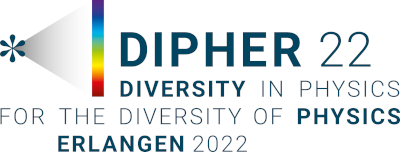I will present an outline of the astronomical outreach activities and resources that we have developed at the Astronomical Observatory of the University of Valencia in Spain. Our first attempts to organise activities for special publics made us notice the lack of resources inclusive enough to serve different kinds of persons in the same audience. We embarked then in the development of...
On February 11, 2021 UNESCO premiered a short video entitled “to be smart, the digital revolution will need to be inclusive." The clip marked the 2021 International Day of Women and Girls in Science and was triggered by the organization’s report on gender in science for that year. Major findings were that despite a shortage of skills in technological fields women still account for only 28% of...
As a theoretical physicist I need to simplify the huge complexity of biological systems to have any chance of understanding something. As a biophysicist working in an interdisciplinary field I need to work with a diverse range of different types of scientists to have any chance of understanding something. Thus my work involves simplification and diversity. In this talk I will first introduce...
Diverse teams do better science: it’s more highly cited, it’s more impactful and it’s more reflective of the societies it serves. Despite that, the representation of women physicists in Germany – and around the world – is still extraordinarily low. Academic hierarchies, funding provides and the ongoing pandemic only perpetuate these inequalities. Jess will talk about how who we talk about...
In Germany, competence measurements in schools in mathematics, natural science and reading show gender differences, which continue to intensify until the choice of field of study (Schiepe-Tiska, Simm & Schmidtner 2016; MINT Nachwuchsbarometer 2022).
In this presentation, I will describe these gender differences and try to explain them against the background of different theoretical...
After introducing General Relativity from a variety of geometrical and field-theoretical perspesctives, I will discuss its implications for the observable Universe. Some puzzles and challenges arise when cosmological and astrophysical observations are applied, since the inclusion of 3 dark sectors is needed. What is the dark energy, the dark matter and the inflaton field? I will discuss some...
During this talk, I will discuss my experiences as a woman in physics as well as introduce my research. My current research focusses on non-Hermitian topological phenomena using non-Hermitian Hamiltonians, which form a useful approach to describe dissipation. I will mention fascinating recent results in this field relating to the breakdown of the famed bulk-boundary correspondence, exceptional...
The ability of a T cell to explore environmental mechanical cues, through bonds formed by its special receptors called T cell receptors (TCRs), is crucial for the first steps of immune recognition. While the mechanobiology of the TCR at the molecular level is increasingly well documented, its link to cell-scale response is poorly understood. We show that the response of T cells, quantified in...
Astronomy is normally done with light. We detect the light from distant objects in our telescope and start to think about its origin. What are the objects which emit this light and how can they do this? We can go a step further and ask what other kind of information from such objects can reach us at Earth. Neutrinos are an example of such another kind of messenger. I will introduce the...
In the last decades there has been a growing awareness that a scientist's gender can have an impact on a successful career in physics, even though it should have no influence. Moreover also other categories of diversity and their impact on a career in science get more and more attention. The talk will present research on gender and diversity in physics with a particular
focus on studies on...

